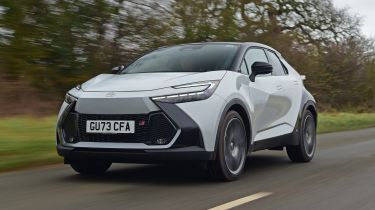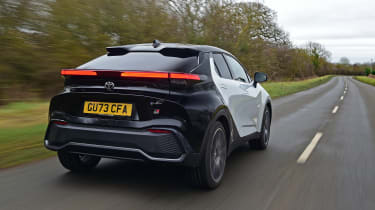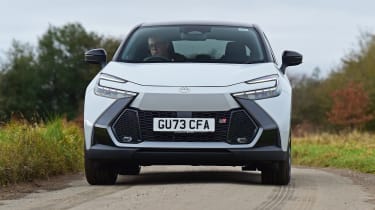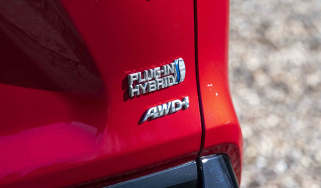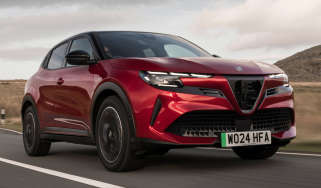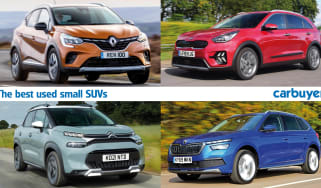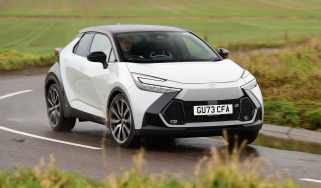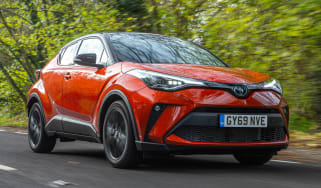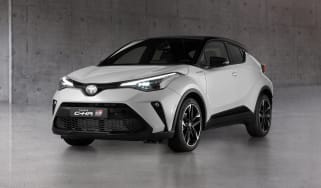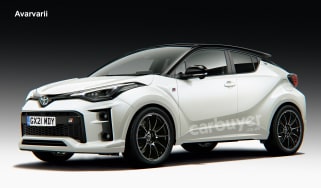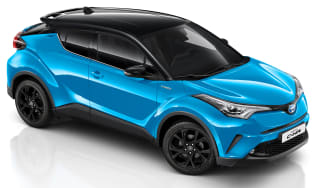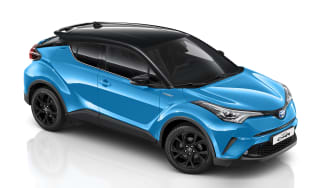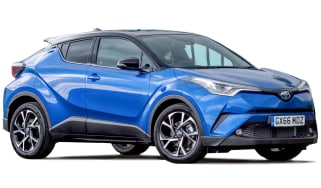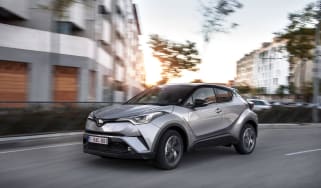Toyota C-HR review - stylish and efficient, but lacks rear space
“The Toyota C-HR is an attractive and efficient SUV that should prove reliable, but it’s not very practical and can get pricey”
Pros
- Efficient
- Good to drive
- Attractive interior
Cons
- Small boot
- Cramped rear seats
- Expensive in higher trims
Verdict – is the Toyota C-HR a good car?
The Toyota C-HR is very efficient without sacrificing driving appeal, comes with lots of kit and benefits from Toyota’s reputation for reliability and a long warranty. However, it’s also not all that practical, with a small boot, tight rear seats and limited towing ability. If you can look past those issues, and the C-HR’s rising price for the plug-in hybrid version and higher trims – mid-range 1.8-litre versions are better value – there’s certainly plenty that appeals.
Toyota C-HR models, specs and alternatives
With its fashionable SUV-coupe styling and affordable running costs, the C-HR has proved to be a smash hit in Europe, with more than 840,000 sales so far. Toyota has been careful not to change the recipe too much for this all-new generation, improving its design to bring it up to date, adding tech and ushering in a plug-in hybrid (PHEV) for the first time.
The C-HR’s styling, though it may not be for everyone, is certainly rather unique, looking unlike any other car in the overcrowded SUV market. You can definitely tell it’s related to the old model, but it now gets a more angular, futuristic look reminiscent of a concept car.
It certainly isn’t short of rivals in the important mid-sized SUV class, from hybrids like the Honda HR-V to all-electric models such as the Volvo EX30 and practical family picks including the Skoda Karoq. There’s arguably more choice of powertrains, shapes and sizes in this corner of the market than at any other time in history. If you want an EV, Toyota offers just one model at the moment, but the bZ4X is more expensive, costing from just over £46,000.
The C-HR is seeking to cover more bases than ever, spanning from the relatively affordable 1.8-litre hybrid costing from around £31,000. all the way up to a 2.0-litre version and a PHEV in top GR Sport and Premier Edition trims. These don’t look quite such good value, with the 2.0-litre GR Sport PHEV starting at more than £43,000, likely limiting its appeal to business drivers. In every case, though, the C-HR is efficient and sends power to its front wheels via an automatic gearbox. We also found it handles with aplomb, but that its CVT transmission is best suited to a fairly relaxed driving style – if you want a performance SUV, the Cupra Formentor is a better bet.
More reviews
In-depth reviews
Inside, the C-HR boasts a well-designed interior that’s appealing to sit in and offers a decent level of technology. It also earns points for sustainability, with lower trims featuring upholstery from recycled plastic bottles. It’s less rosy further back in the cabin, though, with less room in the back and boot than most of its SUV rivals, and a claustrophobic-feeling rear cabin. In fact, the C-HR offers little advantage over a family hatchback in terms of practicality, and this is only made worse if you go for the PHEV, because its larger battery cuts boot size to an underwhelming 310 litres.
|
Trim levels |
Power options |
|
|
Toyota C-HR alternatives
It’s a good job the Toyota C-HR has a well-regarded identity, because it’s easy to get lost in a small SUV class absolutely swimming in petrol, hybrid and electric offerings.
Small SUVs
Stick with petrol and hybrid small SUVs, and there are plenty of compelling options, from the practical Skoda Karoq to the fun Cupra Formentor and many great all-rounders. There aren’t many duds
- Skoda Karoq
- Cupra Formentor
- Hyundai Kona
- Renault Captur
Electric SUVs
If you're ready to make the switch to a fully-electric car, there are also plenty to choose from. Not only that, but the gap in price is narrowing, particularly when compared with the Toyota C-HR PHEV.
- Volvo EX30
- MG4
- Hyundai Kona Electric
- Peugeot E-2008
Should you buy a Toyota C-HR?
Though it may not be particularly quick, the Toyota C-HR feels good to drive and the brand has struck a good balance between driving dynamics and comfort. Depending on your tastes, the Toyota is certainly an interesting-looking car, too, so no one could call it derivative.
Practicality is a low point for the C-HR, though, and that’s where it might get tricky to justify going for a small SUV like this over something like a Kia Sportage, unless you’re only particularly bothered about its higher ride height.
The Toyota C-HR feels much more sophisticated than the previous model, and that’s particularly evident on the inside where there’s wider use of high-quality materials, and a clear and responsive infotainment system adds to the appeal, even if it is a little at odds with the dated driver’s display. We like its sporty driver-friendly feel thanks to the cockpit-like interior that cocoons the driver.
What is the Carbuyer pick of the Toyota C-HR range?
If it were our money we’d stick to the lower-powered 1.8-litre hybrid model in an affordable trim level, because you’ll save a lot of cash but still get a reasonable amount of equipment, and only a slightly smaller infotainment screen. We don’t think it’s worth springing for a higher-spec car unless you really want or need its extra features.
How we tested the Toyota C-HR
We’ve driven the Toyota C-HR on multiple occasions including in mainland Europe, on a variety of UK roads, and as part of a twin test with the Kia Sportage.
Which Is Best?
Cheapest
- Name1.8 Hybrid Icon 5dr CVT
- Gearbox typeAuto
- RRP£31,440
Most Economical
- Name2.0 PHEV Design 5dr CVT
- Gearbox typeAuto
- RRP£39,230
Fastest
- Name1.8 Hybrid Icon 5dr CVT
- Gearbox typeAuto
- RRP£31,440
